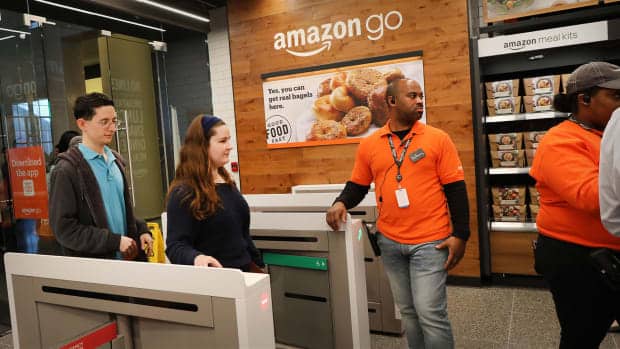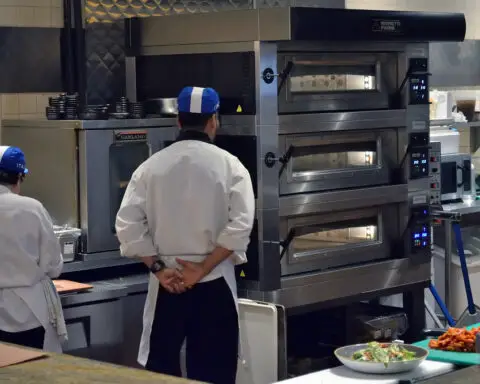Some self-checkout technology just makes sense. Amazon’s “grab-and-go” no checkout technology may feel a bit like stealing, but it’s actually a fully automated process that eliminates both the need to checkout and the ability to steal,
Amazon (AMZN) – Get Free Report Go stores use sensors to charge customers directly through the company’s app. As long as you have the app open and an account, there’s no need to run items over a barcode scanner.
DON’T MISS: This Major Walmart Customer Pain Point Is Getting Worse
Walmart (WMT) – Get Free Report, Target (TGT) – Get Free Report, and other grocery chains have added self-checkout as an option and sometimes have heavily encouraged its use by not staffing traditional checkout lanes well. This option, however, isn’t as seamless as what Amazon offers.
The Walmart, Target, and Kroger (KR) – Get Free Report self-checkout work roughly the same way. Each chain has a bank (or banks) of checkout stations where customers scan the barcodes on their items, bag them, and then pay for them. There’s usually one employee offering helps across multiple stations.
It’s a reasonable setup when a customer has a few items. When they have more, it becomes a logic puzzle as there’s limited staging space. That means that as you bag your items, it makes sense to put the full bags back into your cart. Doing that puts paid items next to unpaid ones and makes theft, both the intentional and the unintentional kind much more likely.
Self-Checkout Leads to Increased Theft
If you take checks and balances off the public, it’s rare that people don’t let you down. That’s what happens when retailers add self-checkout.
“Theft accounts for nearly 4% of inventory for retailers with self-checkout, compared to just 1.5% for traditional checkout,” according to a report from the U.K.’s University of Leicester.
The researchers laid out the key problem when it comes to theft and self-checkout
“Proving intent is difficult where customer non-scanning is identified and deciding whether prosecutions can be made or not is potentially a legal and customer relations minefield,” they wrote in their report.
The challenge is that when you ask customers to handle the checkout process some will be honest and some won’t. Telling the difference between theft, user error, and product failures remains nearly impossible.
“One of the key problems where customer non-scan is observed is in proving intent to steal items and whether prosecutions can be made or not. As one respondent said ‘I scan 20 items and I don’t scan five, am I a thief or am I someone who’s not very competent?’” the report’s authors shared.
Saving Money On Labor Misses the Point
While labor shortages and rising wages make automation attractive for retailers, making theft easier and harder to prove is a pretty major consequence. In addition, many customers simply don’t want to handle their own checkout. Giving them little choice but waiting in a long line or checking themselves out not only builds customer resentment it also exposes staff to that.
When self-checkout happens without the customer having to do anything, it’s a convenience. Making people scan their own items simply passes work from the store to its customer. That’s not a positive unless the customer truly hates interacting with people, only has a few items, or is looking for a better opportunity to steal.
Ultimately, cutting workers in favor of self-checkout may save money even if theft increases. That, however, seems like a slippery slope for Walmart, Target, Kroger, and any other retailer going down that path.
All retailers must balance customer experience versus cost. In this case, they’re delivering a bad experience (except for thieves), and saving money in a way that encourages theft. That’s not something that benefits a business (or its customers) in the long run.
In time, technology will solve this problem. For now, retailers should focus on delivering the best mix of convenience and customer service. That might cost more money — in fact, it will cost more money — but it’s going to be better than giving people something they don’t like that leads to increased stealing both accidental and intentional.
Disclosure: This article may contain affiliate links, meaning we could earn a commission if you make a purchase through these links.






